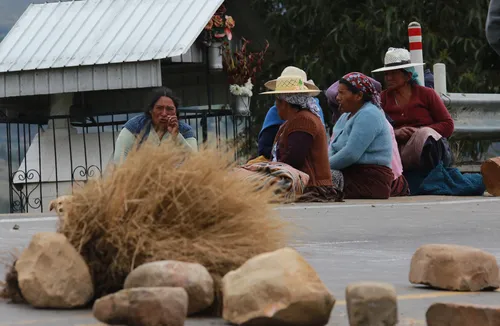
For two weeks, Bolivian roads were blocked by supporters of former president Evo Morales. The reason: the impossibility of the historic leader of the Movement to Socialism (MAS) to run in the 2025 election. The issue raised by the Court in December 2023 exposed a division in the party and took to the streets a political dispute for the candidacy of the Bolivian left in the year that he comes.
The strikes began on January 22 and ended on Wednesday (7), after the Bolivian Chamber of Deputies approved a bill defining the criteria and deadlines for a new judicial election, the main demand of the sectors that support Evo. As a result, the Legislative Assembly has up to 80 days to receive candidates for the election and the elections must take place on September 22nd.
The backdrop of the debates is an electoral dispute within the party between Evo and current president Luis Arce. This internal conflict began when Evo returned to Bolivia in 2020, after spending a year in exile in Argentina due to the coup d’état that led to the overthrow of his government in 2019.
To the Brazil in factpolitical scientist and professor at the Catholic University of La Paz Marcelo Arequipa said that this is the first time that Bolivia’s strongest party has faced a division with large forces.
“For the first time we have on one side the leadership of the political party that is not in government and on the other side there is the one who governs and belongs to that party. Bolivia has always had a concentration of political power in the hands of whoever is governing: the president was also the highest leader of the party. Now, the discussion has to be resolved internally between different sectors,” he said.
The high point of the leadership dispute in MAS was seen in October 2023, when Morales organized a congress in Lauca Eñe, in the district of Cochabamba. The region is the political birthplace and electoral stronghold of the former president. At the event, he called Luis Arce’s supporters “traitors”.
For Marcelo Arequipa, the solution is an internal debate to define who will be the candidate for 2025. “MAS has to hold another congress by May and can change the statute. The primaries are in the last quarter of this year. In these primaries, activists can choose who they want. One important thing is to expand the participation of candidates, not just activists,” he said.
Regardless of the candidate, for political science professor at the Universidad Mayor de San Andrés Franklin Pareja, MAS has enough political strength to win the election in 2025.
“MAS is a great political force of unions and social organizations, it has a presence that radiates throughout the country. Oppositions do not have political strength with this extension. Even with this fight, it can win the elections due to its structure, social base and resources. If it continues like this, another force could even take up space, but this force does not exist and the opposition does not take advantage of the internal rupture in the MAS”, he stated to Brazil in fact.
Court dispute
The Plurinational Constitutional Court of Bolivia decreed in December 2023 that presidents and vice-presidents could only hold office for two terms, consecutively or not. This was a gap that already existed in the Bolivian Constitution. Previously, the Magna Carta stated that the president could not hold office for more than two terms, but did not specify whether they were followed or not. With court ruling 1010, Evo Morales, who was president for four terms, could not return to power.
Evo’s supporters consider that, with a new Constitutional Court, this rule could fall and Evo could return to being a candidate in 2025. According to Pareja, Evo’s supporters have a constitutional right to their demand.
“The Constitution says something that the courts interpret differently, creating a counter-reform. Evo understands that magistrates are using the court to take away their political powers. Technically he is right, because the Constitution was not clear about this and Evo has already been president four times. There should be a bigger discussion,” he said.
The demonstrations that stopped the main roads connecting La Paz to Santa Cruz de la Sierra had an effect and the Chamber called judicial elections. Bolivia is one of the only countries in the world in which the population votes to choose representatives of the Judiciary. The last elections should have been in 2023, but were not organized.
According to the vice-minister of Communication, Gabriela Alcón, the roadblocks had an impact of 982 million dollars on the Bolivian economy. According to the Ministry of the Interior, clashes between police and protesters left 71 police officers injured and 21 people arrested.
Editing: Lucas Estanislau
Source: www.brasildefato.com.br

